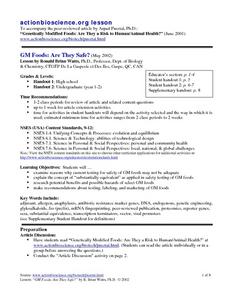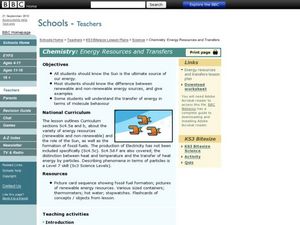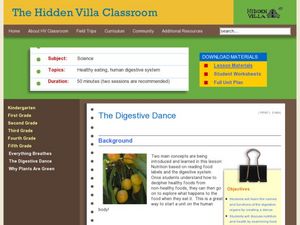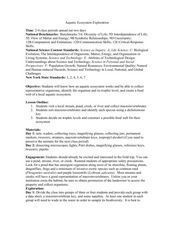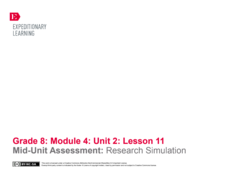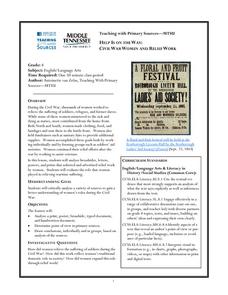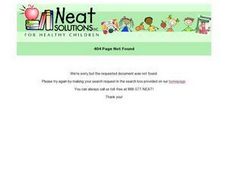Curated OER
GM Foods: Are They Safe?
Students examine the process for testing GM foods. They research benefits and hazards of a selection of GM foods. They also create images of new labels and marketing for GM foods.
Curated OER
Chef Solus Food Safety Crossword Puzzle
In this food preparation crossword puzzle, students read 16 clues about food safety practices and place their answers in a crossword puzzle. There is no word bank.
Curated OER
Chemistry: Energy Resources and Transfers
Students explore the concepts of energy resources and energy transfers. In this chemistry instructional activity, students examine renewable and non-renewable energy sources as they view classroom demonstrations and discuss the concepts...
Curated OER
Producers, Consumers, and the Food Chain
Third graders discuss producers, consumers, and the food chain. In this producers and consumers lesson plan, 3rd graders talk about organisms, the food chain, and the difference between producers and consumers. They complete review...
Curated OER
Where is Agriculture?
Students explore agriculture. In this agriculture lesson, students read "Where is Agriculture?" and discuss all the things that come from agriculture. Students discuss what they need to survive and give examples of agricultural products...
Curated OER
The Digestive Dance
Students read food labels to compare healthy verses non healthy food and then use diagrams to create a poster of the digestive system. In this food lesson plan, students move the food down the digestive track along the digestive system.
Curated OER
Everybody Needs a Little Sunshine
Three activities introduce upper elementary ecologists to photosynthesis and food webs. In the first, an experiment is set up to determine how plants respond to different types of light. In the second, they connect organism cards with...
Curated OER
9th Grade
Ninth graders discuss the principal source of energy entering the marine ecosystem. They name some of the autotrophs at the Maui Ocean Center. Students name some of the heterotrophs at Maui Ocean Center. They are taught that plants are...
Curated OER
What A Tangled Web We Weave
Learners of many ages discuss how all organisms rely on other organisms for their survival. They construct a food web and energy pyramids, and write an informative essay about the food web that they have designed.
Curated OER
Grocery Store Field Study
Students visit a local grocery store (not a community market) to gather information about where some commonly eaten produce items come from. Once they have collected this information, locate the countries of origin on a map and research...
Curated OER
How Much is There to Eat?
Learners examine food production related to population density. In this interdisciplinary lesson, students gather data regarding food production in the American South and in India. Learners follow the outlined steps to calculate the...
Curated OER
Raw Seafood ~ On the Half Shell
The topic is fascinating, but there is not much for learners to do here. Food borne illness has always been a problem for humans to face, and here, data from the Center for Disease Control is analyzed. Learners look at the number of...
Curated OER
Aquatic Ecosystem Exploration
Students visit a local stream, pond, creek, or river and collect macroinvertebrates. They sort macroinvertebrates and identify each species using a dichotomous key. Students decide on trophic levels and construct a possible food web for...
Field Museum
The Case of Darwin's Finches
One of the most striking pieces of evidence for Darwin's Evolution of Species was his observations of finches and how their beaks differed from island to island, depending on their primary food sources. So what would happen to the theory...
EngageNY
Mid-Unit Assessment: Research Simulation
As part of a mid-unit assessment, scholars complete a research simulation about food deserts to mimic the research process. Afterward, they engage in a think-pair-share to discuss what they've learned throughout the unit.
Middle Tennessee State University
Help Is on the Way: Civil War Women and Relief Work
The role women played in the Civil War, especially in relief efforts, is the focus of this seven-page resource. Groups examine primary source materials to determine how this work reflected and expanded the traditional roles women held in...
New York State Education Department
Global History and Geography Examination: January 2010
Agriculture was more revolutionary than some might think. Using a primary source set—including photos of artifacts from Mesopotamia and an amusing comic—learners consider the impacts of the neolithic, agricultural, and green revolutions....
Curated OER
Three Healthful Meals: A Practical Food-Guide-Pyramid Activity
Students activate their knowledge of the food guide pyramid and the basic food groups in order to plan nutritious meals. They collect a handful of food images from magazines and glue them to the appropriate plates.
Curated OER
Going Bananas!©
Students discuss importance of eating five servings of fruits and vegetables for a healthy lifestyle, and identify bananas as an excellent source of energy.
Curated OER
Meat Puzzle
In this health worksheet, 5th graders find eighteen words in a word search. Each word is the name of an animal that may be used as a food source.
Curated OER
Make a Farm
After a class discussion about where their food comes from learners construct a farm from a print-out (embedded in the plan). They work in groups, and trace a food source from the beginning. For example, they discover how a farmer grows...
A to Z Teacher Stuff
Polar Bear Crossword
Show what you know about polar bears with a 10-question crossword puzzle. Questions pertain to a polar bears' habitat, food source, and more!
Curated OER
Starch
Learners examine the basics of starch and how it is used in food. In this photosynthesis lesson students experiment with variables that affect starch production in photosynthesis.
Curated OER
Plankton Parade
Plankton isn't just a tiny cartoon character, it's also a very important food source for animals around the world. Budding scientists discuss the types and functions of plankton, including where they are found, how they are caught, and...


